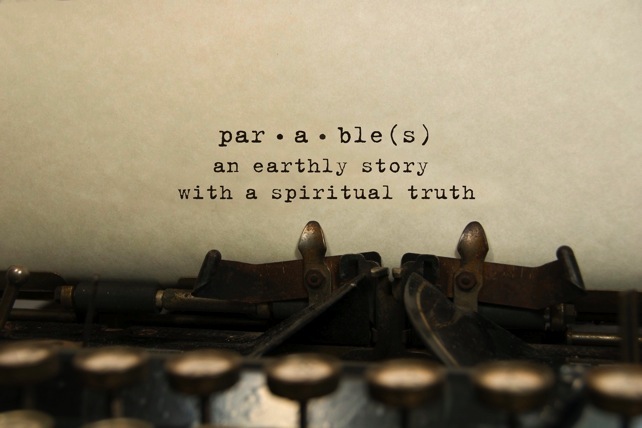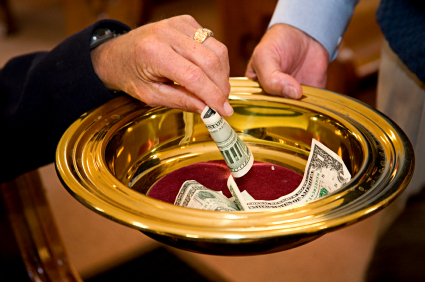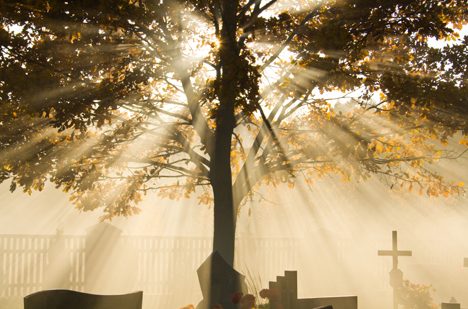Matthew 25.14-30
“For it is as if a man, going on a journey, summoned his slaves and entrusted his property to them; to one he gave five talents, to another two, to another one, to each according to his ability. Then he went away. The one who had received the five talents went off at once and traded with them, and made five more talents. In the same way, the one who had the two talents made two more talents. But the one who had received the one talent went off and dug a hole in the ground and hid his master’s money. After a long time the master of those slaves came and settled accounts with them. then the one who had received the five talents came forward, bringing five more talents, saying, ‘Master, you handed over to me five talents; see, I have made five more talents.’ His master said to him, ‘Well done, good and trustworthy slave; you have been trustworthy in a few things, I will put you in charge of many things; enter into the joy of your master.’ And the one with the two talents also came forward, saying, ‘Master, you handed over to me two talents; see, I have made two more talents.’ His master said to him, ‘Well done, good and trustworthy slave, you have been trustworthy in a few things, I will put you in charge of many things; enter into the joy of your master.’ Then the one who had received the one talent also came forward, saying ‘Master, I knew that you were a harsh man, reaping where you did not scatter seed; so I was afraid, and I went and hid your talent in the ground. Here you have what is yours.’ But his master replied, ‘You wicked and lazy slave! You knew, did you, that I reap where I did not sow, and gather where I did not scatter? Then you ought to have invested my money with the bankers, and on my return I would have received what was my own interest. So take the talent from him, and give it to the one with the ten talents. For to all those who have, more will be given, and they will have an abundance; but from those who have nothing, even what they have will be taken away. As for this worthless slave, throw him into the outer darkness, where there will be weeping and gnashing of teeth.’

I have an idea. We are going to start things off in the sermon a little differently this morning. Instead of sitting patiently and attentively while I spout off about theological ideas and anecdotes, we are going to do an activity…
In the parable of the talents, the master gives to the first slave five talents, the second slave two talents, and to the third slave he gives one talent. During the time of Christ, a talent was worth more than fifteen years of wages for a daily laborer; therefore this was a tremendous amount of money. So, here’s our activity: I want us to imagine that we are the modern equivalent of the master’s slaves, and we are going to discuss what we are going to do with the talents. If you’re sitting in the front third of the sanctuary I want you to imagine that the master has given you $50,000. In the middle third I want you to imagine that the master has given you $20,000. And the back third I want you to imagine that the master has given you $10,000. (If you remember anything from worship today, let it be this: It pays to sit near the front!) Anyway, I would like you to break up into groups of three or four and discuss what you would do with the money for the benefit of the kingdom of God. Begin.
Okay. The master would like to know what you are planning to do with his talents…
Of course, in the parable things work out a little differently. The master has decided to go on a great journey, and entrusts an incredible amount of money to three of his slaves. He provides them with five talents, two talents, and one talent, to each according to his ability. After the master leaves the five talent slave goes off and works hard with his talents and makes five more. Likewise the two talent slave goes off and works hard to earn two more talents. However the one talent slave went off and dug a hole in the ground to hide his master’s money.
The master returns and is greatly thrilled with the first two slaves. He rewards their trustworthy and hardworking nature by placing them in charge of many things, and then invites them into the joy of their master. But with the one talent slave, the master is very disappointed. The third slave was afraid of his master and saw that he was harsh, so he hid the talent in the ground. To which the master replies, “You wicked and lazy slave! You knew, did you, that I reap where I did not sow, and gather where I did not scatter? Then you ought to have invested my money with the bankers, and on my return I would have received what was my own interest.” The master takes away the one talent and orders the slave to be thrown into the outer darkness where there will be weeping and gnashing of teeth.
Out of all the parables that Jesus shared with his disciples, this one has probably been more abused and misused than any other. Once any parable is abstracted from the proclamation of the kingdom, misreading is inevitable. Jesus shared a story about a shepherd who goes after the one sheep that is missing – God rejoices in seeking out those who are lost, even if they appear insignificant. Jesus tells another story about a young man who squanders his inheritance and comes back to his father begging to be welcomed as a slave and the father throws a great banquet for the return of the prodigal – God, though harsh, is a loving, reconciling, and forgiving presence.

The parable of the talents however, has been twisted around to fit the arguments of many pastors and theologians throughout the centuries. For instance, this passage has been cited, in prosperity gospel churches, as a defense for why God wants us to become wealthy; God blesses us money so that we can make more money! Additionally this scripture has been used to claim that the poor are poor because of their own faults and problems, God gave them all the opportunities in the world to become rich, but they failed to pull themselves up by their boot straps and make something of themselves.
Jesus is not using this parable to recommend to his followers that we should work hard, make all the money we can, to give all we can. Instead, the story is a judgment against those who think they deserve what they earned, and a judgment against those who do not know how precious is the gift that they have been given.
The slaves did nothing to earn their five, two, and one talents. They were given as gifts! What becomes crucial is how they regarded the gifts and what they did with them.
A professor of mine in seminary named Stanley Hauerwas is widely regarded as a radical ethicist in the church. He has made some stunning proposals throughout his career about the need for the church to be the church and reclaim a sense of its radical nature in order to return to its mission for the kingdom of God.

Stanley Hauerwas
He argued that we, as pastors, should never perform funerals in funeral homes because the services of death and resurrection should always take place where baptisms happen. He argued that we, as pastors, should never marry strangers off the street but take the time to know them intimately before bringing them together in holy marriage. He argued that we, as pastors, should remove American Flags from sanctuaries because the flag’s presence blurs the line between what our country expects of us, and what God requires of us. But one of the strangest proposals he ever made has to do with money and the church.
When we receive new members we often have them stand up here in front of the church like Tom and Linda will do a little bit later and take vows of membership. They promise to serve the church with their time and gifts for the glory of God. We then applaud them and shake their hands after the service.
Hauerwas believes that we should add a new requirement to membership. Whenever we receive new members, they should stand in front of the entire gathered body and announce how much money they earn in a calendar year… (pause for dramatic emphasis)
“Hi, I’m Taylor Mertins. Born and raised in Alexandria, Virginia, I am a transplant to the Staunton region and I really enjoy the pace of life here. I serve as a pastor in the United Methodist Church and I make $36,500 a year.”
His reasoning behind this is two-fold: It would allow the church to have greater transparency regarding the wealthy during times of need. If everyone knows who the bigger earners are, they can seek them out when someone in the community is in dire straits, or if the church needs immediate help with something.
It would also allow the church to recognize the great gaps of wealth within the local congregation regarding the rich and the poor. When a family joins that make very little during the year, it would allow us to know who it is that we can truly help by consolidating our resources. We, as Americans, do such a good job at trying to cover up our socioeconomic status that we are blind to those who are in need in the pews next to us.
What do you think? Should we adopt his plan here at St. John’s?
I’m not so sure. I understand his idea on principle, but I believe that it would result in us abusing one another and it would prevent us from viewing everyone as part of the body of Christ. If you discovered that one of the humble women in the church was a millionaire wouldn’t you treat her differently? If you discovered that one of the men who appears very wealthy has no money at all, wouldn’t you treat him differently?
Yet, at the same time, I really like Hauerwas’ idea. It would push us to be more vulnerable with one another about what we have to offer, and what we need. So I’m going to offer a slightly different proposal. What if, when we received new members, we required them to share their talents with us?

Jesus’ parable of the talents uses money, but in the big picture it has nothing to do with money at all. God, as the master, has given each of us unique abilities and talents that we have been tasked to use in the world for the kingdom. To some he has given more talents than to others, which is to say the hand is not the foot, nor is the arm like the leg, in the body of Christ. Yet everyone has been blessed with some talent that is beautiful, wonderful, and incredibly important.
Jesus’ disciples are called to do the work that Jesus has given us to do — work as simple and hard as learning to tell the truth and learning to love our enemies. Such work is the joy that our master invites us to share with him.
The slaves that earned more with their talents did so because they worked with what they had. No effort is made to describe how the slaves doubled their talents, but that they worked hard with the talents the master had given them. However the one talent slave rationalizes his failure to do anything with the talent entrusted to him by blaming the master! How often are we guilty of the same thing? —Blaming God for the failures that are indeed our fault.
Since the beginning of the church is has been a routine for Christians to excuse themselves by protesting that their gifts are too modest to be significant. How can little ole me possibly do anything for God’s kingdom?
Let me assure each of you of the contrary: You have been given gifts, wonderful and unique talents, that are begging to be used in the church for the world, and in the world for the church. You might not recognize them as such, you might feel insecure about whatever they are, but God has endowed you with the gifts so that they can be used. If you hide them inwardly, if you dig a hole in the ground, you fail to make good on the investment that God has made in you.
Jesus insists, through the parable, that the talents that God has provided us are to be used and implemented to their full ability. Christian discipleship is not something that we can just hope our pastors or churches can carry us through, but instead requires hard work. It demands that we take a good look at our lives and talents and ask how we can put them to use for God’s kingdom.
What talents do you see in your life? Are you a teacher who has the gift of sharing the Good News of God’s Word with others? A carpenter who has the gift to repair and shape shelters for others? A prayer warrior who has the gift to pray for our church, our community, and our world? A financially savvy individual who has the gift of helping others learn how to manage and invest their money? A nurse or doctor who has the gift of healing and presence?
I see a church full of Christians who have gifts that God has given.
Church should be like a great talent show where we share with others what God has given us, so that we can them employ those gifts for the kingdom. What are you doing with your talents?
Amen.















